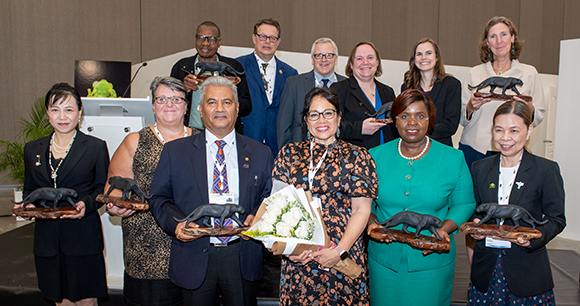
Panama City, Panama—Exemplary wildlife law enforcement leaders from seven countries were recognized Tuesday with the Clark R. Bavin Wildlife Law Enforcement Award at the 19th meeting of the Conference of the Parties (CoP) to the Convention on International Trade in Endangered Species of Wild Fauna and Flora (CITES) in Panama City.
Since 1994, the Animal Welfare Institute (AWI), in coordination with the Species Survival Network, has presented the prestigious award at CITES CoPs to individuals, organizations, and agencies that have demonstrated excellence in combatting wildlife crime.
The award is named for the late chief of the US Fish and Wildlife Service's Office of Law Enforcement, who pioneered the agency's highly effective use of covert investigations and “sting” operations to uncover illegal wildlife trade.
“This stellar group of honorees is responsible for saving countless elephants, rhinos, pangolins, turtles, sharks, and other at-risk species from poachers, smugglers, and other wildlife criminals,” said AWI President Cathy Liss. “Their in-depth investigations have led to the arrest and successful prosecution of sprawling criminal syndicates that traffic innocent wildlife, along with drugs and weapons.”
The 2022 Clark R. Bavin Wildlife Law Enforcement Award recipients are:
- Anti-smuggling Bureau of China Customs for diligently pursuing the arrests of numerous international wildlife criminals engaged in the trafficking of massive quantities of elephant ivory, rhinoceros horns, and other wildlife products. The bureau also has participated in global joint operations to combat the smuggling of endangered wildlife, organized training workshops for law enforcement partners, and coordinated public awareness campaigns to protect wildlife.
- Ryan Bessey, special agent at the US Fish and Wildlife Service, and Ryan Connors, senior trial attorney at the US Department of Justice, for dismantling a North American turtle smuggling operation involving thousands of CITES-listed turtle species. Their successful collaboration resulted in prison time and substantial fines imposed on the American and Chinese criminals responsible for the illegal collection and international trade of turtles.
- Lance Cruse, intelligence officer at the United Kingdom’s Border Force, for sharing his extensive knowledge of wildlife trafficking with police and customs officers, veterinarians, and others committed to ending wildlife crime. Cruse has trained colleagues around the globe, including in Panama, and has prepared various guidelines, handbooks, and species checklists to aid enforcement efforts.
- Jonnes Alfred Kadamika, retired head of a covert investigations unit of the Malawi Police Service, for his instrumental role in dismantling the Lin-Zhang gang, one of southern Africa’s most prolific wildlife crime syndicates involved in the illegal trafficking of pangolin scales, rhino horns, ivory, hippo teeth and other goods; 10 gang members were sentenced to a combined 68 years in prison. As an honorary parks and wildlife officer in Malawi, Kadamika continues to share intelligence leading to the arrests of other wildlife criminals.
- Thanatchon Kengkasikij, police colonel with the Royal Thai Police, for his nearly two decades of service combatting wildlife and forest crimes in Thailand and Asia, resulting in hundreds of arrests. Kengkasikij has conducted investigations into the illegal trade of big cats, live birds, elephant ivory, and shahtoosh (wool from a rare Tibetan antelope), including at the infamous Chatuchak Weekend Market in Bangkok. He was a longstanding member of the Thailand Wildlife Enforcement Network and helped establish the regional ASEAN Wildlife Enforcement Network.
- Ahmed Ali Mohamed, wildlife law enforcement officer at Kenya Wildlife Service, for his outstanding leadership in planning and executing multiple covert operations to apprehend notorious wildlife criminals, disrupt the link between poaching and terrorism financing, and intercept suspects to prevent future poaching. Over his 17-year career, Mohamed has led or participated in the arrests of numerous criminals in possession of elephant tusks, rhino horn, pangolin scales, explosives, and illegal weapons. In 2020, he arrested a suspect and recovered pieces of ivory despite being stabbed during the operation.
- Paul Montuori, special agent at the US Fish and Wildlife Service, for launching investigations at home and abroad to take down wildlife criminals engaged in the illegal trade of kingsnakes, tarantulas, dried seahorses, pipefish, shark fins, scorpions, and other wildlife parts and products, including from species protected under CITES and the Endangered Species Act.
- Tilotama Varma, additional director at the Wildlife Crime Control Bureau in India, for her leadership in conducting hundreds of multiagency operations leading to the discovery of 950 CITES violations and the arrests of nearly 1,600 wildlife criminals since 2015. Varma has trained more than 66,000 police and forest officers and conceptualized, planned and coordinated a number of species-specific operations targeting crimes involving turtles, big cats, birds, mongoose, pangolins, and other species in India. She also has collaborated in several Interpol-led investigations.
“Wildlife crime is a global problem that requires a worldwide commitment to solve,” said DJ Schubert, wildlife biologist for AWI. “It affects us all by harming biodiversity, threatening the lives of brave law enforcement officers, and stealing our collective wildlife heritage from present and future generations. We owe tremendous thanks to these honorees for their remarkable efforts to protect wildlife.”
More information about the Bavin awards can be found here.
Marjorie Fishman, Animal Welfare Institute
[email protected], (202) 446-2128
The Animal Welfare Institute (awionline.org) is a nonprofit charitable organization founded in 1951 and dedicated to reducing animal suffering caused by people. AWI engages policymakers, scientists, industry, and the public to achieve better treatment of animals everywhere—in the laboratory, on the farm, in commerce, at home, and in the wild. Follow us on Facebook, Twitter, and Instagram for updates and other important animal protection news.